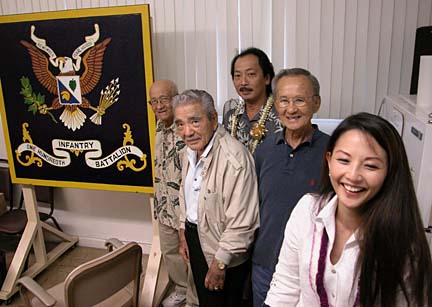
CRAIG T. KOJIMA / CKOJIMA@ STARBULLETIN.COM
World War II veterans who were members of the 100th Battalion and 442nd Regimental Combat Team are hopeful that a new effort to tell their story will make it to the big screen. Independent filmmaker Lane Nishikawa, wearing a lei, is joined by veterans Shigeru Tsubota, left, Saburo Nishime, Dr. Denis Teraoka and actress Tamlyn Tomita.
Film to tell tale
of 442nd, 100thLane Nishikawa, a moviemaker,
hopes to film "Only the Brave"
starting next year
Saburo Nishime and Dr. Denis Teraoka say it's about time Hollywood brings back the story of the 100th Battalion and 442nd Regimental Combat Team -- World War II Army units comprised mainly of Japanese Americans -- to the big screen.
"There's so many people, not only on the mainland, but here, that have no idea what we did," said Teraoka, a dentist and a member of the 100th Battalion's D Company, reflecting upon the history of the most-decorated unit of its size in the U.S. military. "This is especially true about the younger generation."
Nishime, now a retired electrical foreman and one of the few members of 100th Battalion to serve in all of the combat campaigns, said: "It's a good idea. It tells our story. People have a tendency to forget."
It has been more than half a century since Hollywood has used a cast of Japanese Americans to tell the story of the two Japanese American units.
There have been numerous attempts -- many of them unsuccessful -- to focus on the battles the nisei, or second-generation Japanese Americans, faced not only on the battlefields of France and Italy, but also at home. Many of them were initially classified as "enemy aliens," had their homes confiscated by the U.S. government and were sent to relocation camps in remote areas of America, forced to live behind barbed-wire fences.
Now longtime playwright and independent filmmaker Lane Nishikawa, who was born in Wahiawa but raised in Northern California, believes he is closer to succeeding.
Soldiers of the 100th Battalion, many of them drafted before the bombs started falling on Pearl Harbor on Dec. 7, 1941, believe the updated tribute is long overdue. The 1951 "Go for Broke" movie may have been about the nisei soldiers, but it was centered around the Caucasian officers who led the unit, many nisei veterans say.
Age is working against many of these nisei veterans, especially members of the 100th Battalion, whose early exploits led to the eventual call for Japanese-American volunteers and the formation of the 442nd Regimental Combat Team in 1943. They welcome Nishikawa's "Only the Brave" movie.
It's a story of valor, of many battles, especially in the dark forests of France's Vosges mountain range, where the 100th Battalion and the 442nd Regimental Combat Team suffered nearly 800 casualties in rescuing 211 soldiers from Texas. Two rifle companies in one 442nd battalion were decimated.
The Army considers the rescue of the "Lost Battalion" one of the most significant battles since the Revolutionary War. Seven soldiers earned the Distinguished Service Cross, the country's second-highest medal for valor. At one point, Lt. Col. Alfred Pursall, the 442nd's 3rd Battalion commander, rose from cover and led a charge in a hand-to-hand battle.
Because of this "Banzai Hill" charge, Pvt. Barney Hajiro was recommended for the Medal of Honor after single-handedly destroying two machine-gun nests, though he was hit on the cheek, body and forearm. Hajiro didn't get the Medal of Honor then. It took an act of Congress nearly six decades later.
The rescue of the Texans of the 141st Regiment is a pivotal point of the $750,000 film Nishikawa hopes to begin filming early next year on the backlots of Universal Studios in Los Angeles. The nearby Angeles National Forest will double for northern France. Nishikawa has assembled a cast of 37 actors, with 27 of them Asian Americans like Tamlyn Tomita, known for her lead roles in "Karate Kid II," "Joy Luck Club" and "Picture Bride," and George Takei, part of the "Star Trek" crew.
"The Lost Battalion is the main arch of the film," Nishikawa said last week. "The other parts deal with the retaking of a French town and the effects of going home."
One of the reasons Nishikawa believes he will succeed where others have failed is that his 100-minute film is built around the successes of early short feature films -- "When We Were Warriors" and "Forgotten Valor" -- and successful plays and television shows dealing with nisei wartime experience. In 2001, "Forgotten Valor" won the award of best short feature at the Hawaii International Film Festival.
Nishikawa hopes "Only the Brave" will pull together nisei experience, from the tales of discrimination and despair of people who were herded into relocation camps after the Japanese attacked Pearl Harbor, to the generation who volunteered to fight for a country that questioned their loyalty.
"They went through so many battles," said Nishikawa, who has dedicated the past 20 years of his life to creating stories, plays and movies about the Japanese-American experience. "The story of the Lost Battalion says something of these men when, given an objective, they came through, but the cost was very high. It says a lot of war and those times. You can stop and think of what is going on today."
It's a lesson that bears repeating, says Goro Sumida, 83.
"I made a lot of friends being with the 100th," Sumida said. "They would do anything for you. They would give you the shirt off of their back. ... It's worth telling the story. The young people have to learn how we were treated in the war."
Donations to help "Only the Brave" can be mailed to the National Japanese American Historical Society, 1684 Post St., San Francisco, CA 94115.
